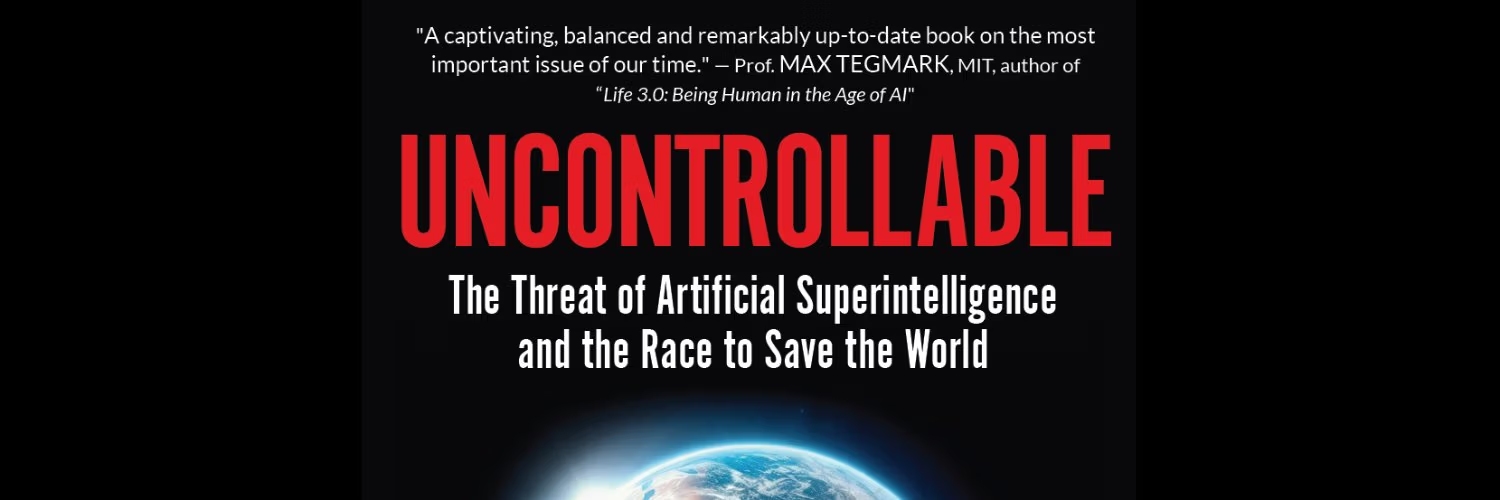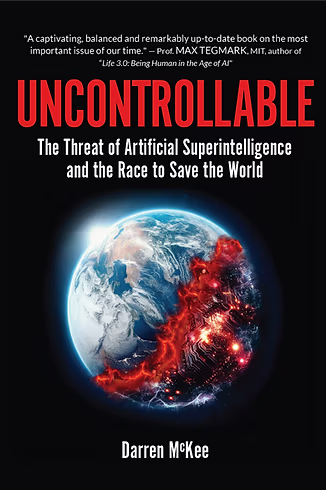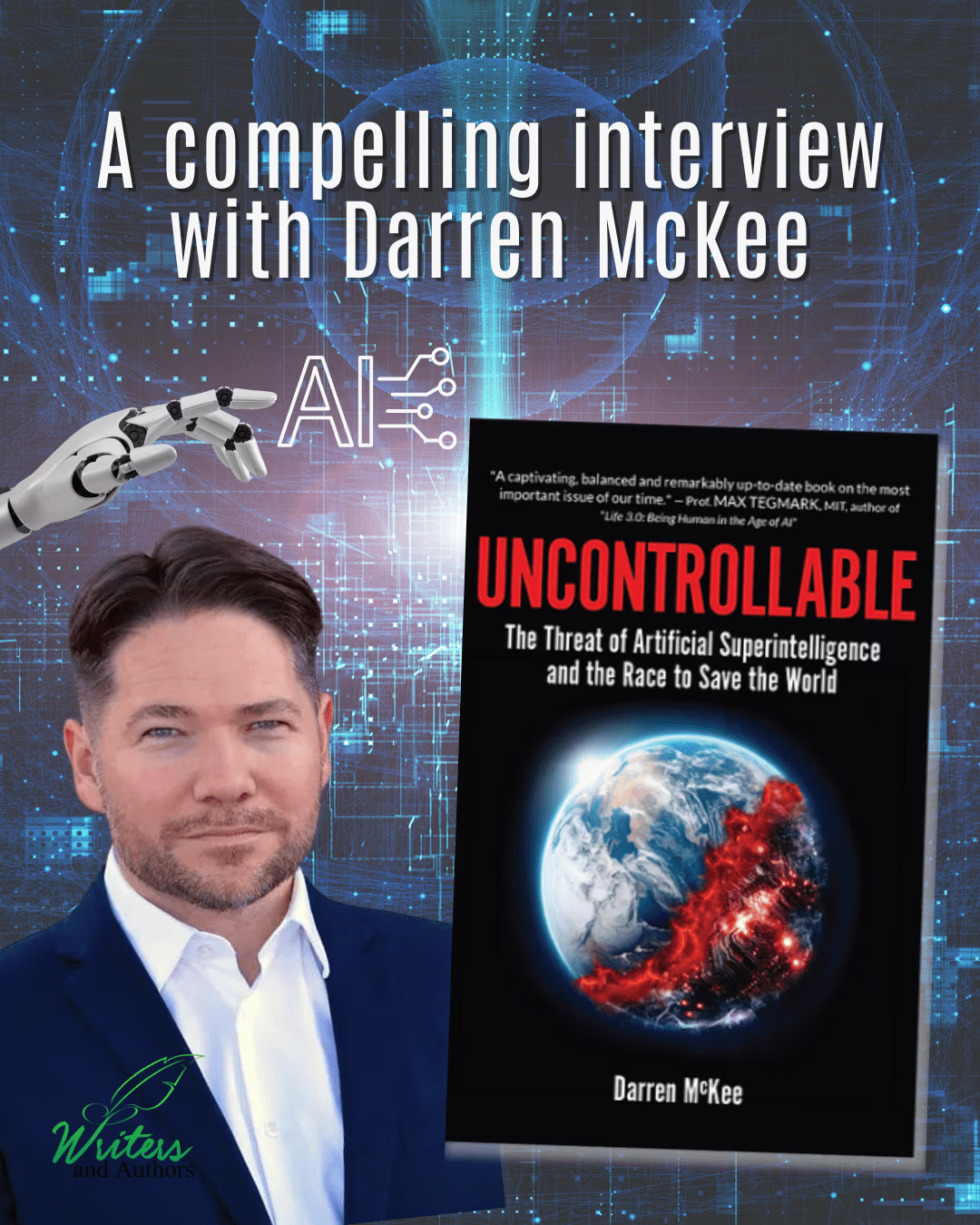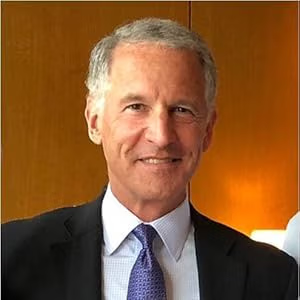Artificial intelligence (AI) is transforming the world we live in at an unprecedented pace. From self-driving cars to intelligent virtual assistants, AI is now a part of our daily lives. While AI has the potential to revolutionize industries and improve the quality of life, it also poses significant risks and challenges. To better understand the power and peril of AI, I had the opportunity to interview Darren McKee, an AI expert with years of experience working in the field. In this blog, we will explore the insights shared by McKee and discuss actionable suggestions for creating a safer future with AI.
Interview with Darren McKee about his new release, “Uncontrollable: The Threat of Artificial Superintelligence and the Race to Save the World.”
 Can you provide a brief overview of your book, “Uncontrollable,” and what inspired you to explore the topic of artificial superintelligence? Uncontrollable explores the power and peril of advanced AI using compelling analogies suitable for diverse audiences. It examines artificial intelligence as a concept and technology, describes what AI is, how image generators and language models work, and how we don’t fully understand what is happening in these AI systems. It provides evidence to show that artificial superintelligence presents a risk to humanity, and demonstrates that it will be very difficult to understand, control, or align as it rapidly increases in capabilities and becomes more integrated into how we work, live, and play. Uncontrollable clearly communicates the urgency to act now and provides concrete suggestions for society and concerned citizens to create a safer future with AI.
Can you provide a brief overview of your book, “Uncontrollable,” and what inspired you to explore the topic of artificial superintelligence? Uncontrollable explores the power and peril of advanced AI using compelling analogies suitable for diverse audiences. It examines artificial intelligence as a concept and technology, describes what AI is, how image generators and language models work, and how we don’t fully understand what is happening in these AI systems. It provides evidence to show that artificial superintelligence presents a risk to humanity, and demonstrates that it will be very difficult to understand, control, or align as it rapidly increases in capabilities and becomes more integrated into how we work, live, and play. Uncontrollable clearly communicates the urgency to act now and provides concrete suggestions for society and concerned citizens to create a safer future with AI.
Learn more about Darren and his book on how website https://www.darrenmckee.info/
Motivation and Purpose: What motivated you to write a book about the threat of artificial superintelligence? Why is this an important topic for people to understand? Artificial intelligence is poised to be the most significant development to affect our lives now, and in the coming years. More powerful than nuclear bombs and as impactful as electricity, fire, and oil rolled into one, advanced AI might bring us untold wonders but it could also be a threat to our jobs, our relationships, and our place in the world. There are many books about AI, but none that were written for a general audience and entirely dedicated to the topic of risk from advanced AI systems.
Key Messages: What are the key messages or takeaways that you hope readers will gain from reading “Uncontrollable”?
- Advancements in AI are happening exponentially quickly, and we need to act now to create a safer future with AI.
- It’s important for all people to have an informed opinion so they can take effective action to enable safe AI innovation.
- AI presents a great risk of diverse harms. It can be used to spread misinformation, develop bioweapons, or even lead to extinction-level threats.
- AI systems are not fully understood, even by their creators, and it is uncertain how to ensure that they are aligned with our values (and even whose values will take priority). As AI becomes further integrated into our society and reaches a level of superintelligence, it may become uncontrollable.
- AI safety researchers are outnumbered 100 to 1 by those developing AI. A small number of people are making decisions that may forever change life for the rest of us.
Research Process: Can you share insights into your research process for the book? How did you gather information and what sources did you find most valuable? The AI issue touches so many different domains – a key aspect of acquiring an appropriate background and context was reading a diverse range of non-fiction books. I found books like Max Tegmark’s Life 3.0 and Stuart Russell’s Human Compatible to be useful, as well as podcasts including The Future of Life Institute’s and Last Week in AI.
Diving into the Content: Without giving away too much, can you discuss some of the key challenges and risks associated with artificial superintelligence that you highlight in the book? Since people are building AI systems, it is reasonable to think that we understand exactly how they work and why they do what they do. Unfortunately, this is not the case. Humans have created sophisticated learning algorithms, but AI do most of the learning on their own. As such, no one can precisely say why a system like ChatGPT provides the response that it does. Additionally, even when great efforts are made to make these systems safer and robust to attacks, they can still easily be made less safe, and manipulated to provide responses that they aren’t supposed to. This is a broad and deep challenge that will not be easily addressed.
The main risks are that AI systems will cause harm by accident, through misuse by bad actors, or if they become highly autonomous and capable, it is possible AI systems will seek power for themselves. AI systems can already win at games that require strategy and some processing of how humans think, such as poker. Additionally, AI systems have already demonstrated manipulative behavior in simulated settings. If we get to a level of artificial superintelligence, these risks become much more concerning.
Human Response to ASI: How do you envision humanity responding to the emergence of artificial superintelligence, based on your research and analysis? As a society, there are significant economic and personal incentives to continue to develop increasingly powerful AI systems. People will want the products and services that AI brings, and AI companies will happily provide them. The complication is that for every good use of AI, there is a corresponding bad use. So, there will be greater misinformation, deep fakes, autonomous weapons, and AI systems gaining more control. I would expect a range of responses, from those skeptical of technological developments, to those fully embracing AI systems. Some may happily benefit from AI taking over aspects of human work, but further AI integration could also displace numerous human workers.
The Race to Save the World: The subtitle of your book mentions “the race to save the world.” Can you elaborate on what this race entails and who the key players are in this scenario? The most obvious race is between those developing ever more powerful AI systems, and those trying to ensure we do so safely. But, ultimately, the race is with ourselves. As humans we have the desire to create, explore, and develop new technologies that improve our lives. Yet, we also want to be safe and work towards a secure future. These competing tendencies create a race dynamic, and it might be one of the most important races in human history.
Ethical Considerations: In your exploration of artificial superintelligence, did you delve into the ethical considerations surrounding its development and deployment? What ethical frameworks should guide the creation of ASI? Ethical considerations are a key theme throughout the book. There are specific discussions about algorithmic bias and employment displacement, but each chapter of the book serves the broader ethical consideration of how we can ensure the development of safe AI that benefits humanity. The book promotes a broad, democratic path to developing AI, and seeks to encourage everyone to be involved to ensure their interests are represented. We need overt national, regional, and international conversations about what to do about AI. Uncontrollable provides support for such discussions.
Balance of Power: How do you see the balance of power shifting globally with the emergence of artificial superintelligence, and what geopolitical implications might arise? There is good reason to be concerned that the development of artificial superintelligence will further exacerbate inequality. Advanced AI may be able to make life better for billions of people, but it may also increase the wealth of others, further amplifying inequalities. Additionally, an artificial superintelligence would be a threat to the national security of any nation, not unlike nuclear weapons. Every nation will be affected by powerful AI systems held by other nations. This situation creates the potential for geopolitical conflict.
Preventing a Negative Outcome: In your research, did you come across strategies or solutions proposed by experts to prevent negative outcomes associated with artificial superintelligence? Can you discuss some of these? The final part of my book is devoted to what we can do as a society, and what you can do as an individual, to enable safe AI innovation. Some broad policy proposals include initiatives such as investing heavily into AI safety research, having meaningful and robust audits and evaluations of powerful AI models, and ensuring liability for harm caused by powerful AI models.
The Role of Regulation: Do you believe that regulation is necessary to manage the development and deployment of artificial superintelligence? How can regulatory frameworks be effectively implemented? Meaningful, targeted regulation is critical to manage the development and deployment of AI. Most AI companies are for-profit businesses or are backed by them, so the interests of a profit-seeking company are often going to be different than members of the public. Ideally, there would be both national and international agreement on the regulation of critical components such as computer chips. This has already begun but more can be done to ensure a detailed understanding of who has enough chips, and of what type, to build powerful, frontier AI systems. While some regulations, like those requiring more transparency of AI systems, apply to all AI companies, regulations to hold multi-billion dollar firms accountable are most important for advanced AI safety.
Public Awareness and Education: How important is it for the general public to be aware of the issues surrounding artificial superintelligence, and what role can education play in preparing society for these potential challenges? It’s critical that every citizen is aware of the issues surrounding AI. AI progress is happening so quickly, and we need to get everyone up to speed and engaged as soon as possible. Decisions are being made right now that will affect all of our lives in the next few years. Once people have a better understanding of the issues, they can encourage their elected representatives and businesses to address current and future concerns about the clear risks that AI presents.
Collaboration in AI Development: Given the global nature of artificial intelligence development, how do you see international collaboration playing a role in addressing the challenges posed by artificial superintelligence? International collaboration is essential for safe AI development. We need governments, business, and citizens from different countries all working together to be able to develop AI more safely. Ethically, it is unjust to only have a few Western governments or corporations decide the AI rules and risks for the rest of the world.
Personal Reflection: On a more personal note, how has researching and writing this book influenced your own views and concerns regarding the future of artificial superintelligence? Through the book writing process it became clear to me that there is a disconnect between how fast AI capabilities are increasing and the public’s understanding of them. AI progress has not slowed down and is set to accelerate. Spending countless hours with the topic made it clear to me that we need to act urgently to ensure safe AI innovation.
What do you hope readers will do after finishing your book? Do you have a call to action or specific steps you believe individuals or organizations should take? I hope readers feel more informed about the state of AI, understand that we face grave risks, but also that we have hope. I think organizations should be advocating for important policy proposals like governance of AI computer power, liability, and audits and evaluations. I think individuals can share the information they have learned in Uncontrollable with their friends, and support organizations that are concerned about AI safety. What is likely most effective is for readers to engage their political representatives. Together, we can make a safer world. Learn more about Darren and his book on how website https://www.darrenmckee.info/

I am an Advisor to Artificial Intelligence Governance and Safety Canada (AIGS Canada) and a Senior Policy Advisor with over 15 years experience across a broad range of domains, including science and technology, behavioural science, and foresight. Prior to working with AIGS Canada, I have followed the world of artificial intelligence and related issues for years, exploring AI language models, image generators, deepfakes and the social implications thereof. In 2021, I co-authored a chapter on AI and Autonomy in the book “Westworld Psychology,” and have two academic publications. Academically, I have a Master of Science (Experimental Psychology) and a Master of Public Administration (Global Governance concentration).
In addition to my work on AI and in policy, I am the host of the international award-winning podcast The Reality Check. It’s a top 0.5% (Listen Notes) podcast and has been downloaded over 4 million times. I’ve presented hundreds of diverse topics related to science and critical thinking, explaining many complicated subjects to a wide audience in an engaging manner.
Learn more about Darren and his book on how website https://www.darrenmckee.info/
#1 BEST SELLER AMAZON.ca – A compelling and clear exploration of the power and peril of advanced artificial intelligence that provides actionable suggestions for all citizens to create a safer future with AI.
“A captivating, balanced and remarkably up-to-date book on the most important issue of our time.” — Max Tegmark, Professor of Physics at the Massachusetts Institute of Technology and New York Times bestselling author of Life 3.0: Being Human in the Age of AI
“The most accessible and engaging introduction to the risks of AI that I’ve read.” — William MacAskill, Professor of Philosophy at the University of Oxford and New York Times bestselling author of What We Owe The Future
“Written in a fluid and engaging style that allows the reader to deepen their understanding almost effortlessly. It is well-suited to public policy makers tasked with finding solutions, and to citizens interested in the big picture behind the issues.” — Duncan Cass-Beggs, Executive Director of the Global AI Risk Initiative at the Centre for International Governance Innovation (CIGI)
 We are living in a world of rapid change and technological progress.
We are living in a world of rapid change and technological progress.
Artificial intelligence is poised to be the most significant development to affect our lives now, and in the coming years. More powerful than nuclear bombs and as impactful as electricity, fire, and oil rolled into one, advanced AI might bring us untold wonders but it could also be a threat to our jobs, our relationships, and our place in the world.
Is artificial intelligence dangerous? How does artificial intelligence work? Will artificial intelligence take over?
Uncontrollable uses engaging analogies and relatable examples to summarize AI for beginners, and unpacks AI risk and safety for readers without a technical background.
Uncontrollable examines artificial intelligence as a concept and technology, describes what AI is, how image generators and language models work, and how we don’t fully understand what is happening in these AI systems. It provides evidence to show that artificial superintelligence presents a risk to humanity, and demonstrates that it will be very difficult to understand, control, or align as it rapidly increases in capabilities and becomes more integrated into how we work, live, and play.
We are not prepared.
Yet, we can be. Uncontrollable clearly communicates the urgency to act now and provides concrete suggestions for society and concerned citizens to create a safer future with AI.
Uncontrollable is a first-of-its-kind publication and call to arms to address the defining issue of our time.
Artificial intelligence holds immense potential to revolutionize industries, enhance healthcare and improve our daily lives. Still, there are also significant risks to be addressed to ensure a safer future for society. We need to focus on regulating and monitoring the development and use of AI, incorporating transparency, and improving our understanding of AI’s potential benefits and risks. As we continue to navigate this rapidly changing technological landscape, we need to work together to ensure that AI remains a force for good. With concerted effort and collaboration, we can harness the power of AI and create a safer and more prosperous future for all.





















